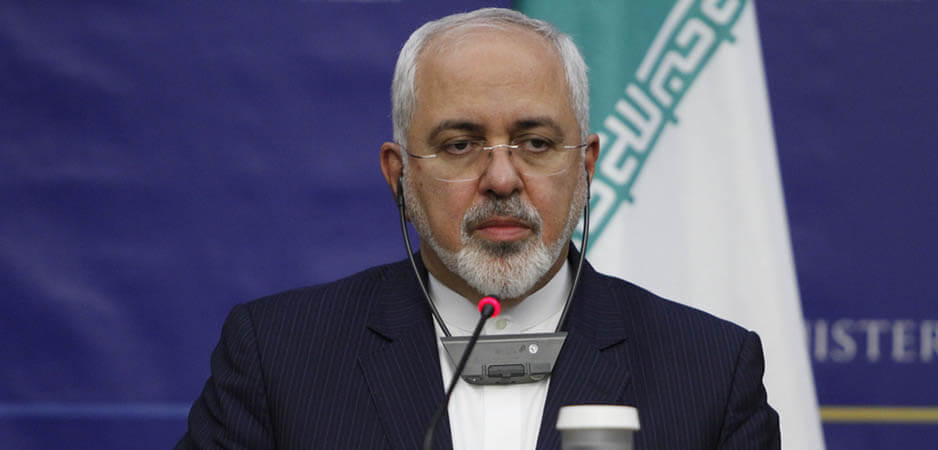Amid tension in Tehran, Foreign Minister Javad Zarif tried to resign from his post.
The ongoing saga of Iranian Foreign Minister Javad Zarif shows how chaotic the government has become. On February 25, he announced his resignation via Instagram, stating: “I apologize for not being able to continue in the post and for all the shortcomings and flaws in the period.” President Hassan Rouhani has since rejected his attempt to leave office.
The foreign minister’s actions are believed to have exposed a rift between Zarif and the supreme leader, Ayatollah Ali Khamenei, as well as the Islamic Revolutionary Guard Corps (IRGC). Zarif handed in his resignation soon after he was allegedly excluded from a meeting with Syrian President Bashar al-Assad, who was on his first visit to Iran since the civil war in Syria began in 2011.
Yet part of the reason behind Zarif’s public attempt to resign was to pressure Khamenei into approving the Financial Action Task Force (FATF) — an intergovernmental body that sets global standards for banks — which Iran is required to be compliant with for anti-money laundering purposes. Indeed, this is the only card left for Rouhani and Zarif to play.
Whilst the news about Zarif was a shock to Western media, for Iranians it was not a surprise. It is believed that Zarif submitted his resignation in January, days before the expediency discernment council’s first meeting to consider approving the FATF. Rouhani’s alleged reaction to the move was revealing. He said: “The supreme leader is not against the FATF, why are we not approving the FATF adoption?”
The answer to this may lie in Rouhani and Zarif’s failure to deliver on a host of promises. They were both tasked with 11 important issues, including a nuclear deal, improving the economy, ending the war in Yemen and approving the FATF. The nuclear agreement has since fallen apart following the US withdrawal in 2018, the economy is stagnant, the Yemen War has been prolonged by Tehran’s malign influence and the FATF remains unapproved.
Zarif’s role has increasingly been to promote Tehran’s missile program and defend human rights abuses in Iran. In reality, regional affairs and normalizing relations with other countries, or lack thereof, have been designed by Khamenei and Qasem Soleimani, chief commander of the IRGC’s Quds Force.
Due to failed promises over the Joint Comprehensive Plan of Action (JCPOA) — the nuclear deal — especially economic pledges, Rouhani and Zarif have lost much credibility in the eyes of the people. Iranians who voted for Rouhani are disappointed in his government’s failure to resist hard-liners, many of whom opposed the JCPOA. Since Zarif essentially became a public relations officer for the “axis of resistance” — an alliance of Iran, Syria and Lebanon’s Hezbollah — Iranians have been increasingly convinced that neither Rouhani nor Zarif are capable of confronting the hard-liners.
Getting FATF Approved
Nevertheless, Zarif and Rouhani have one card left to play, which would require Iran to adopt FATF requirements. Despite Europe launching a so-called special purpose vehicle — a payment system to “facilitate legitimate financial transactions with Iran” — the adoption of FATF requirements against money laundering and terror financing by Iran is a necessity to circumvent US sanctions. Approving the FATF would be Zarif and Rouhani’s last chance to gain support inside and outside the country, push back the hard-liners and heal a crippled economy until the 2020 US presidential election, in the hope of a Democrat winning and rejoining the JCPOA.
This may prove unachievable as approving the FATF would imply the end of supplying support for proxies and terrorist groups across the Middle East. This support, delivered in the form of weapons and money to Hezbollah in Lebanon, Houthi rebels in Yemen and Hamas in Gaza, has been an effective tool for Khamenei staying in power. It has also had a devastating and destabilizing effect on the region, none more so than Yemen and Lebanon.
It is clear that the row over the FATF has caused tension in Tehran. Ayatollah Khamenei indirectly responded to Zarif’s resignation, stating, “[U]nlike claims by our officials the Islamic revolution is stronger than before and therefore, we will continue on our path.”
 Zarif’s failure stems from his attempt to balance two different roles internationally and domestically. On one hand, he was undeniably successful in public relations, able to portray Iran as a nation the West should normalize relations with. On the other hand, he remained faithful to the axis-of-resistance ideology, which backfired amongst moderate Iranians.
Zarif’s failure stems from his attempt to balance two different roles internationally and domestically. On one hand, he was undeniably successful in public relations, able to portray Iran as a nation the West should normalize relations with. On the other hand, he remained faithful to the axis-of-resistance ideology, which backfired amongst moderate Iranians.
However, in Iran, where the supreme leader and his team hold absolute power, Zarif got caught in his double act. In essence, by announcing his resignation, the foreign minister made a gamble and his most significant miscalculation. Indeed, the move has failed considerably as it is seen as a threat by hard-liners.
Zarif tried to twist Khamenei’s arm by threatening him with chaos inside the country in an effort to approve the FATF. This could have major consequences for Zarif and Rouhani as the supreme leader is now probably more suspicious than ever, which may result in the rejection of the FATF in their final meeting. Zarif’s resignation has resulted in another failure, surely bringing him one step closer to the end of his diplomatic career.
It is evident that Javad Zarif and the moderates in Iran have lost once again against Ayatollah Khamenei. If the international community wants to avoid a war with Iran, negotiate with Tehran over its nuclear and missile programs and halt its funding of regional proxies, then it should have welcomed Zarif’s resignation. Indeed, this is the only way to finally sit down with Iran and Khamenei’s real foreign ministers: Ali Akbar Velayati, Qasem Soleimani and Ali Akbar Salehi.
*[Update: This article previously stated that Qasem Soleimani was the chief of the IRGC.]
The views expressed in this article are the author’s own and do not necessarily reflect Fair Observer’s editorial policy.
Support Fair Observer
We rely on your support for our independence, diversity and quality.
For more than 10 years, Fair Observer has been free, fair and independent. No billionaire owns us, no advertisers control us. We are a reader-supported nonprofit. Unlike many other publications, we keep our content free for readers regardless of where they live or whether they can afford to pay. We have no paywalls and no ads.
In the post-truth era of fake news, echo chambers and filter bubbles, we publish a plurality of perspectives from around the world. Anyone can publish with us, but everyone goes through a rigorous editorial process. So, you get fact-checked, well-reasoned content instead of noise.
We publish 2,500+ voices from 90+ countries. We also conduct education and training programs
on subjects ranging from digital media and journalism to writing and critical thinking. This
doesn’t come cheap. Servers, editors, trainers and web developers cost
money.
Please consider supporting us on a regular basis as a recurring donor or a
sustaining member.
Will you support FO’s journalism?
We rely on your support for our independence, diversity and quality.






